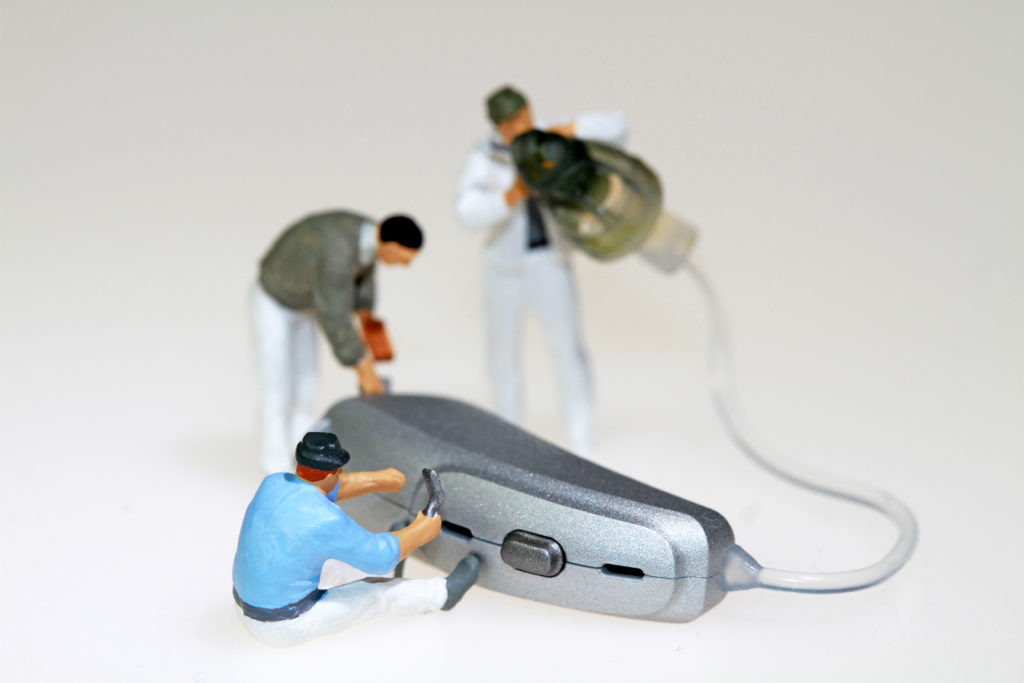Hearing Aid Services
Services & Repairs
If you notice that your hearing aids are not working as they should, you may want to try these simple steps first…scroll down to see some troubleshooting tips, below.
We’d love to see you to help!
Give us a call (512) 444-8684 or click below to Schedule Online.

Our Process
What Tests Will Be Done?
Troubleshooting Common Hearing Aid Issues
Make sure that the hearing aid is turned on
This is probably the most basic troubleshooting procedure. Some people who are not yet fully-familiar with the hearing aids they are using might forget to turn it on before use.
Turn up the volume
If the hearing aid is turned on but you don’t hear anything, you can check the volume if it is set at an appropriate level. There are instances when the volume is turned down instead of turned up resulting in no sound output.
Check the batteries
If your hearing aid is running on disposable batteries, make sure that the batteries are positioned correctly in the hearing aids. You can also try using new batteries just to rule out battery issues. Pro tip: If your hearing aid batteries don’t last as long as they usually do, your hearing aids might need repair.
Check the tubing (for behind-the-ear/BTE models)
For BTE hearing aids, you need to check the tubing because it can sometimes be damaged or get worn over time. If BTE hearing aid tubing shows signs of breakage or wear & tear, it needs to be endorsed to a hearing clinic for repair or replacement. If your hearing aid is still not functioning properly even after troubleshooting, you need to have it checked by an audiologist.
Hearing Aid Repair: When to Call the Pros?
-You experience excessive whistling or feedback. This could indicate an improper physical fit with a BTE ear mold or custom hearing aid. Even if the hearing aids fit perfectly during the initial fitting, the size and shape of the ears can change over time, especially with significant weight loss.
-If the hearing aids have been irreversibly damaged (cracked, broken or has visible holes on the faceplate or the shell).
Never attempt to repair the hearing aids on your own. The price you have to pay for losing its warranty or damaging it further is not worth it. Get your hearing aids fixed by a professional, someone who knows the ins and out of hearing aid electronics.
Preventing the Need for Hearing Aid Repair
Think of hearing aids as your own personal products that need proper care and cleaning. Because of their small sizes, it can be easy for earwax and other dirt to be trapped in the tiny holes and spaces of hearing aids. To avoid excessive build-up from clogging the microphone, receiver, and sound ports, it is highly important to clean the device daily with a clean and dry cloth or tissue.
Aside from keeping the device clean, the ears must be kept clean, too! By keeping the hearing aids and the ears free of dirt and debris, the need for frequent hearing aid repairs can be lessened.
Keep Earwax at Bay
Earwax is a natural secretion of the ears, but excessive secretion may block the ports or crevices of hearing aids. To keep earwax at bay, clean the outer ears with a washcloth. Don’t use cotton buds, Q-tips or any other pointed, foreign objects that may end up pushing the earwax further into the ears.
Keep Hearing Aids Dry
The leading cause of hearing aid repair is prolonged exposure to moisture. With daily use, it’s easy for moisture to accumulate in the device.
To avoid moisture accumulation, open the battery compartment of your hearing aids and remove the batteries to allow the device to air dry. A hearing aid dehumidifier can also help keep moisture levels to a minimum and prolong the life of hearing aids.
Hearing Aid Repair - Austin, Texas
Even with the best care and maintenance, hearing aids may still be subject to damage or technical issues. Hearing aids may be tiny devices with powerful working parts and digital components. Part of hearing aid maintenance includes periodic repair and firmware updates.
Austin Hearing Aid Center can repair most devices with minor issues on-site the same day. We have the tools and expertise to carry out fast and efficient hearing aid repair. For hearing aids with more extensive damages, our office will take care of the shipping and handling to and from the manufacturer.
Do you accept servicing and repair for hearing devices from another hearing healthcare office? Yes! We are happy to service or repair your hearing aids, whether you got it from our clinic or from somewhere else. Our team is equipped to provide service and repair from any hearing aid brands.
Book Appointment
Get Directions
Our office is conveniently located off Ben White and Menchaca Road. We take our time with each person, therefore, it is necessary to schedule your appointment in advance.
-
4403 Menchaca Road, Suite E
Austin, TX 78745 - (512) 444-8684
- (512) 444-8697
Testimonials
What People Say?
Testimonials
What People Say?



Frequently Asked Questions
I provide a comfortable place for people to come have their hearing tested and discuss their hearing concerns. I offer a free, no obligation hearing aid evaluation. If it turns out that you are a candidate for hearing aids, there is a 45-day trial period that includes follow up care to assure proper adjustment.




 For 15 years my audiologist Mr Randolph and his assistant have gave me the best service I could ever expect and a 5 Star rating is not enough for them and they deserve the amount of stars in the universe which are unmeasurable just as is my gratitude towards both of them.
——-
For 15 years my audiologist Mr Randolph and his assistant have gave me the best service I could ever expect and a 5 Star rating is not enough for them and they deserve the amount of stars in the universe which are unmeasurable just as is my gratitude towards both of them.
——-